Research Methods: Epistemology, Ethics, and Qualitative Analysis
VerifiedAdded on 2023/01/12
|6
|1450
|33
Report
AI Summary
This report delves into the core aspects of qualitative research, beginning with an introduction to epistemology, the study of knowledge acquisition. It explores various epistemological approaches, including pragmatism, positivism, realism, and interpretivism, highlighting their suitability for qualitative research. The report emphasizes the importance of the interpretivism approach in qualitative studies, which embraces subjective meanings and social phenomena. It also outlines acceptable parameters for qualitative research, emphasizing the need for reliable data and verifiable facts while acknowledging the role of researcher perspectives. Furthermore, the report addresses ethical considerations in research, emphasizing principles of beneficence, non-maleficence, informed consent, and respect for participants. The conclusion summarizes key findings, underscoring the importance of selecting the appropriate epistemology and adhering to ethical guidelines for producing credible and impactful qualitative research. The report also includes a comprehensive list of references, including books and journal articles.
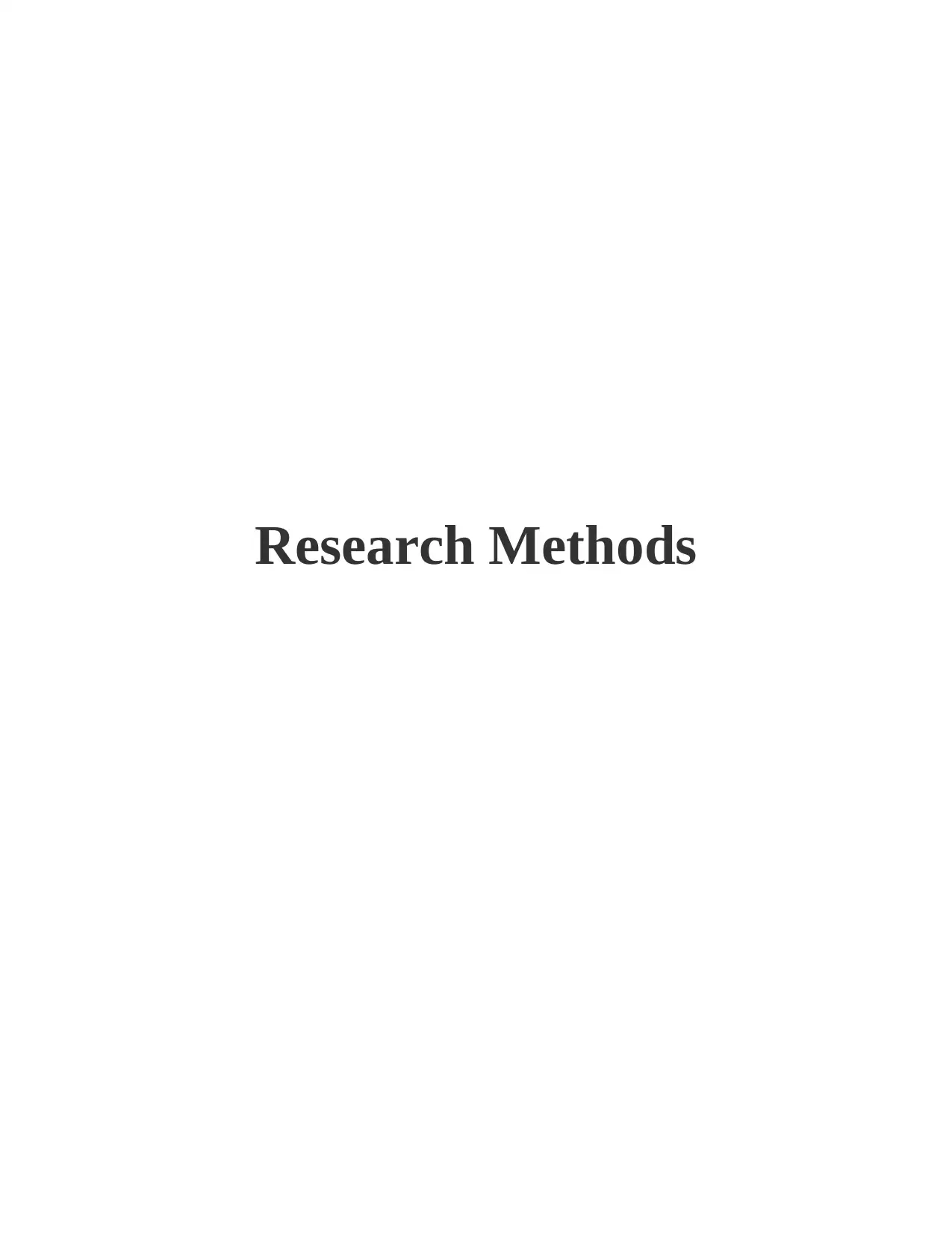
Research Methods
Paraphrase This Document
Need a fresh take? Get an instant paraphrase of this document with our AI Paraphraser
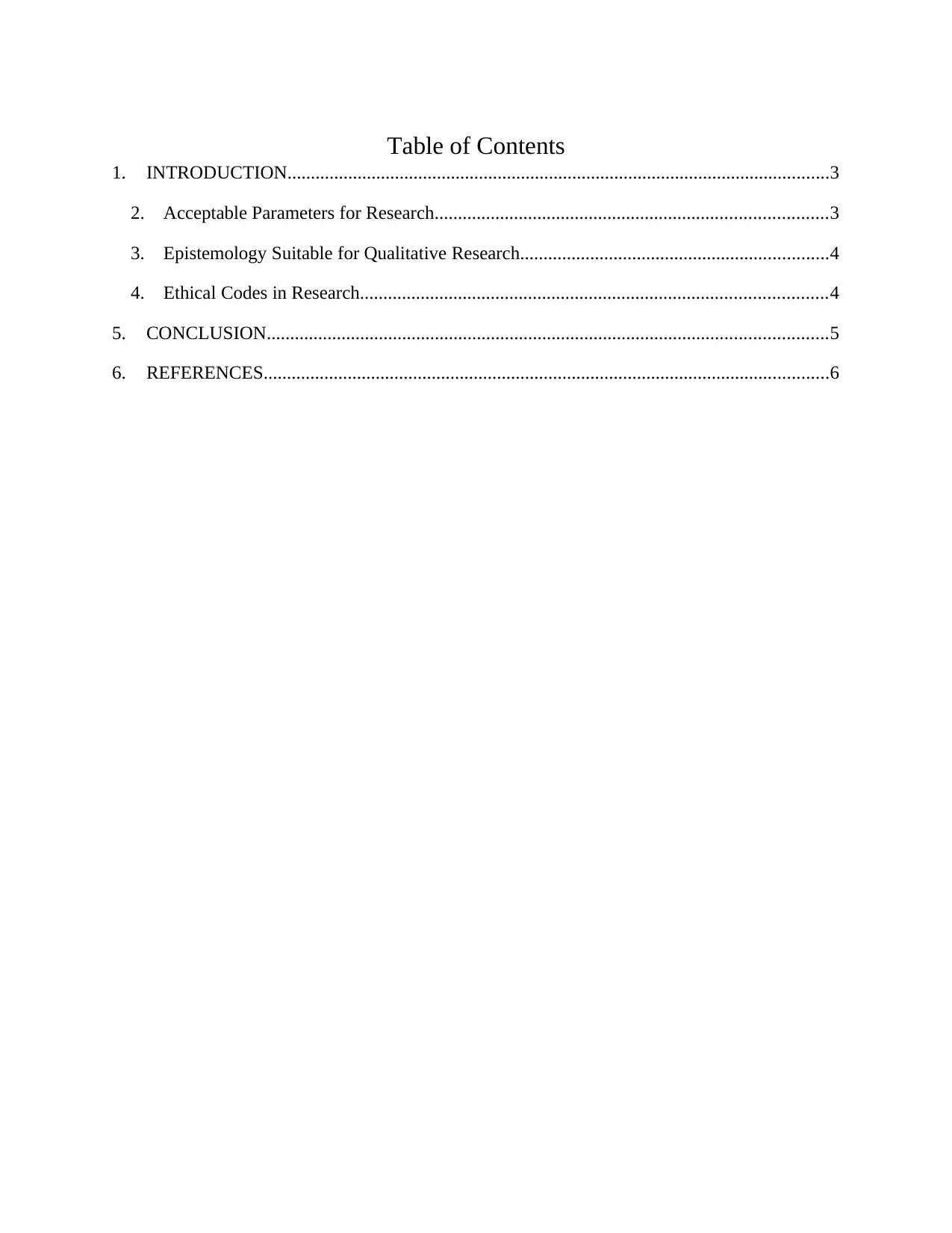
Table of Contents
1. INTRODUCTION....................................................................................................................3
2. Acceptable Parameters for Research....................................................................................3
3. Epistemology Suitable for Qualitative Research..................................................................4
4. Ethical Codes in Research....................................................................................................4
5. CONCLUSION........................................................................................................................5
6. REFERENCES.........................................................................................................................6
1. INTRODUCTION....................................................................................................................3
2. Acceptable Parameters for Research....................................................................................3
3. Epistemology Suitable for Qualitative Research..................................................................4
4. Ethical Codes in Research....................................................................................................4
5. CONCLUSION........................................................................................................................5
6. REFERENCES.........................................................................................................................6
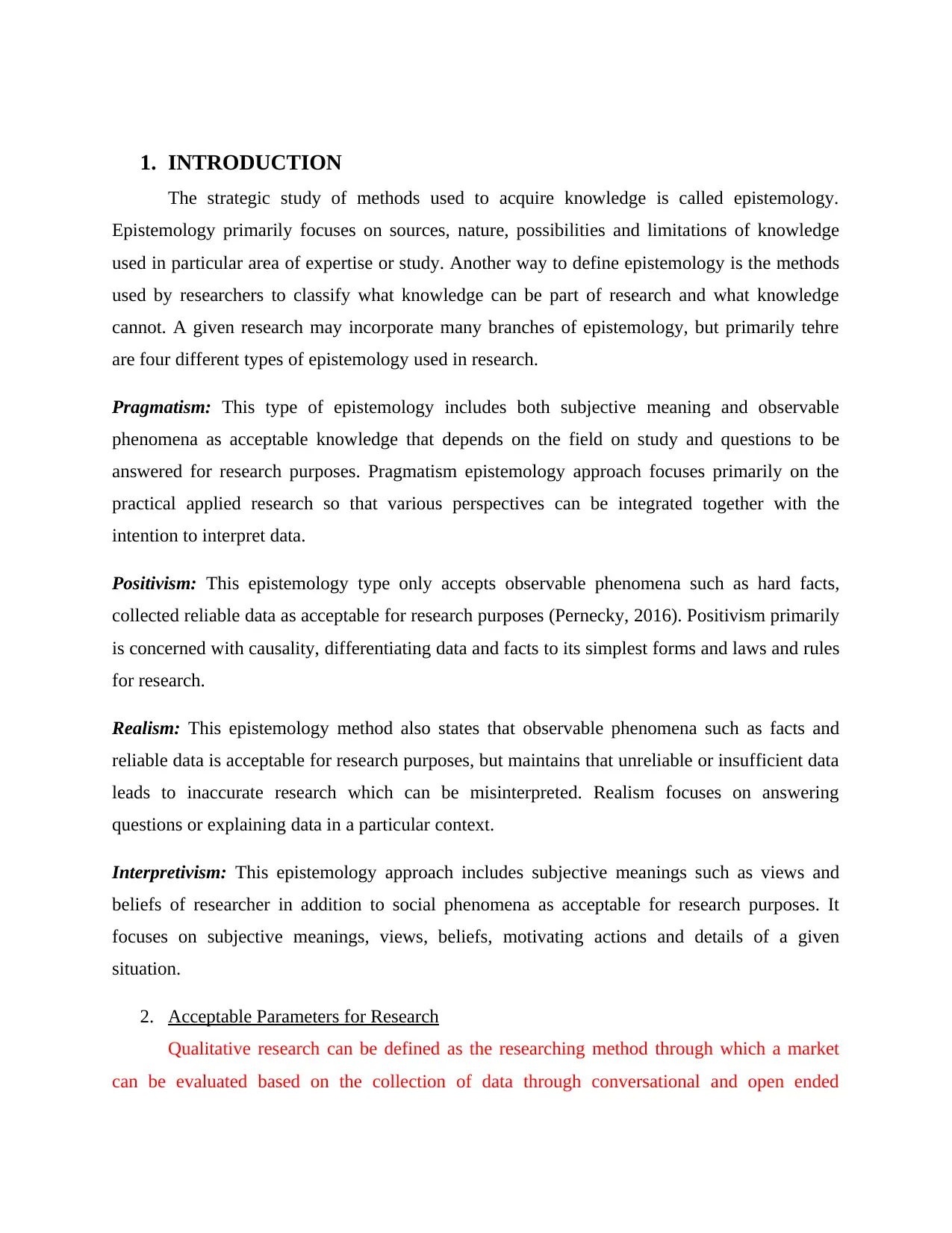
1. INTRODUCTION
The strategic study of methods used to acquire knowledge is called epistemology.
Epistemology primarily focuses on sources, nature, possibilities and limitations of knowledge
used in particular area of expertise or study. Another way to define epistemology is the methods
used by researchers to classify what knowledge can be part of research and what knowledge
cannot. A given research may incorporate many branches of epistemology, but primarily tehre
are four different types of epistemology used in research.
Pragmatism: This type of epistemology includes both subjective meaning and observable
phenomena as acceptable knowledge that depends on the field on study and questions to be
answered for research purposes. Pragmatism epistemology approach focuses primarily on the
practical applied research so that various perspectives can be integrated together with the
intention to interpret data.
Positivism: This epistemology type only accepts observable phenomena such as hard facts,
collected reliable data as acceptable for research purposes (Pernecky, 2016). Positivism primarily
is concerned with causality, differentiating data and facts to its simplest forms and laws and rules
for research.
Realism: This epistemology method also states that observable phenomena such as facts and
reliable data is acceptable for research purposes, but maintains that unreliable or insufficient data
leads to inaccurate research which can be misinterpreted. Realism focuses on answering
questions or explaining data in a particular context.
Interpretivism: This epistemology approach includes subjective meanings such as views and
beliefs of researcher in addition to social phenomena as acceptable for research purposes. It
focuses on subjective meanings, views, beliefs, motivating actions and details of a given
situation.
2. Acceptable Parameters for Research
Qualitative research can be defined as the researching method through which a market
can be evaluated based on the collection of data through conversational and open ended
The strategic study of methods used to acquire knowledge is called epistemology.
Epistemology primarily focuses on sources, nature, possibilities and limitations of knowledge
used in particular area of expertise or study. Another way to define epistemology is the methods
used by researchers to classify what knowledge can be part of research and what knowledge
cannot. A given research may incorporate many branches of epistemology, but primarily tehre
are four different types of epistemology used in research.
Pragmatism: This type of epistemology includes both subjective meaning and observable
phenomena as acceptable knowledge that depends on the field on study and questions to be
answered for research purposes. Pragmatism epistemology approach focuses primarily on the
practical applied research so that various perspectives can be integrated together with the
intention to interpret data.
Positivism: This epistemology type only accepts observable phenomena such as hard facts,
collected reliable data as acceptable for research purposes (Pernecky, 2016). Positivism primarily
is concerned with causality, differentiating data and facts to its simplest forms and laws and rules
for research.
Realism: This epistemology method also states that observable phenomena such as facts and
reliable data is acceptable for research purposes, but maintains that unreliable or insufficient data
leads to inaccurate research which can be misinterpreted. Realism focuses on answering
questions or explaining data in a particular context.
Interpretivism: This epistemology approach includes subjective meanings such as views and
beliefs of researcher in addition to social phenomena as acceptable for research purposes. It
focuses on subjective meanings, views, beliefs, motivating actions and details of a given
situation.
2. Acceptable Parameters for Research
Qualitative research can be defined as the researching method through which a market
can be evaluated based on the collection of data through conversational and open ended
⊘ This is a preview!⊘
Do you want full access?
Subscribe today to unlock all pages.

Trusted by 1+ million students worldwide
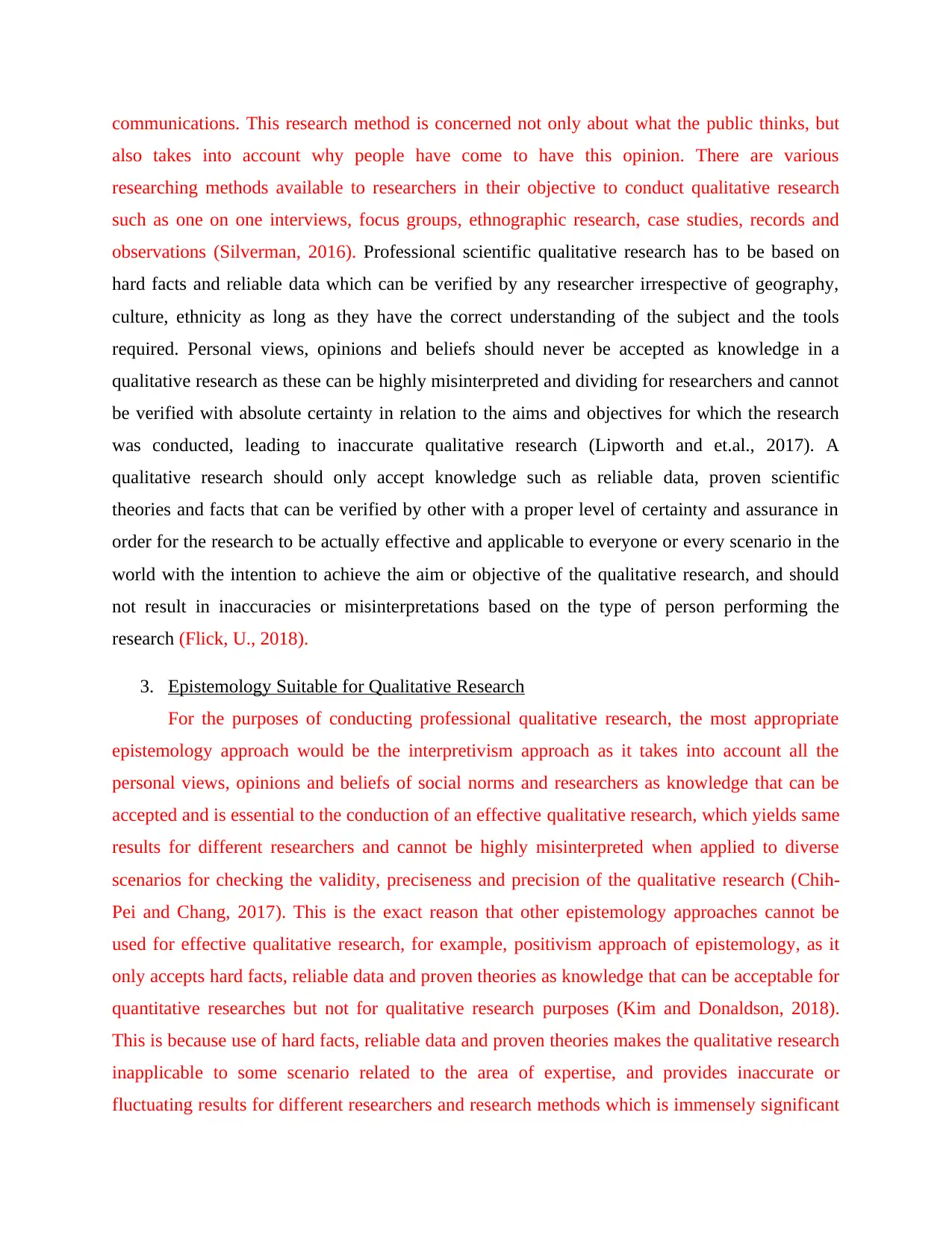
communications. This research method is concerned not only about what the public thinks, but
also takes into account why people have come to have this opinion. There are various
researching methods available to researchers in their objective to conduct qualitative research
such as one on one interviews, focus groups, ethnographic research, case studies, records and
observations (Silverman, 2016). Professional scientific qualitative research has to be based on
hard facts and reliable data which can be verified by any researcher irrespective of geography,
culture, ethnicity as long as they have the correct understanding of the subject and the tools
required. Personal views, opinions and beliefs should never be accepted as knowledge in a
qualitative research as these can be highly misinterpreted and dividing for researchers and cannot
be verified with absolute certainty in relation to the aims and objectives for which the research
was conducted, leading to inaccurate qualitative research (Lipworth and et.al., 2017). A
qualitative research should only accept knowledge such as reliable data, proven scientific
theories and facts that can be verified by other with a proper level of certainty and assurance in
order for the research to be actually effective and applicable to everyone or every scenario in the
world with the intention to achieve the aim or objective of the qualitative research, and should
not result in inaccuracies or misinterpretations based on the type of person performing the
research (Flick, U., 2018).
3. Epistemology Suitable for Qualitative Research
For the purposes of conducting professional qualitative research, the most appropriate
epistemology approach would be the interpretivism approach as it takes into account all the
personal views, opinions and beliefs of social norms and researchers as knowledge that can be
accepted and is essential to the conduction of an effective qualitative research, which yields same
results for different researchers and cannot be highly misinterpreted when applied to diverse
scenarios for checking the validity, preciseness and precision of the qualitative research (Chih-
Pei and Chang, 2017). This is the exact reason that other epistemology approaches cannot be
used for effective qualitative research, for example, positivism approach of epistemology, as it
only accepts hard facts, reliable data and proven theories as knowledge that can be acceptable for
quantitative researches but not for qualitative research purposes (Kim and Donaldson, 2018).
This is because use of hard facts, reliable data and proven theories makes the qualitative research
inapplicable to some scenario related to the area of expertise, and provides inaccurate or
fluctuating results for different researchers and research methods which is immensely significant
also takes into account why people have come to have this opinion. There are various
researching methods available to researchers in their objective to conduct qualitative research
such as one on one interviews, focus groups, ethnographic research, case studies, records and
observations (Silverman, 2016). Professional scientific qualitative research has to be based on
hard facts and reliable data which can be verified by any researcher irrespective of geography,
culture, ethnicity as long as they have the correct understanding of the subject and the tools
required. Personal views, opinions and beliefs should never be accepted as knowledge in a
qualitative research as these can be highly misinterpreted and dividing for researchers and cannot
be verified with absolute certainty in relation to the aims and objectives for which the research
was conducted, leading to inaccurate qualitative research (Lipworth and et.al., 2017). A
qualitative research should only accept knowledge such as reliable data, proven scientific
theories and facts that can be verified by other with a proper level of certainty and assurance in
order for the research to be actually effective and applicable to everyone or every scenario in the
world with the intention to achieve the aim or objective of the qualitative research, and should
not result in inaccuracies or misinterpretations based on the type of person performing the
research (Flick, U., 2018).
3. Epistemology Suitable for Qualitative Research
For the purposes of conducting professional qualitative research, the most appropriate
epistemology approach would be the interpretivism approach as it takes into account all the
personal views, opinions and beliefs of social norms and researchers as knowledge that can be
accepted and is essential to the conduction of an effective qualitative research, which yields same
results for different researchers and cannot be highly misinterpreted when applied to diverse
scenarios for checking the validity, preciseness and precision of the qualitative research (Chih-
Pei and Chang, 2017). This is the exact reason that other epistemology approaches cannot be
used for effective qualitative research, for example, positivism approach of epistemology, as it
only accepts hard facts, reliable data and proven theories as knowledge that can be acceptable for
quantitative researches but not for qualitative research purposes (Kim and Donaldson, 2018).
This is because use of hard facts, reliable data and proven theories makes the qualitative research
inapplicable to some scenario related to the area of expertise, and provides inaccurate or
fluctuating results for different researchers and research methods which is immensely significant
Paraphrase This Document
Need a fresh take? Get an instant paraphrase of this document with our AI Paraphraser
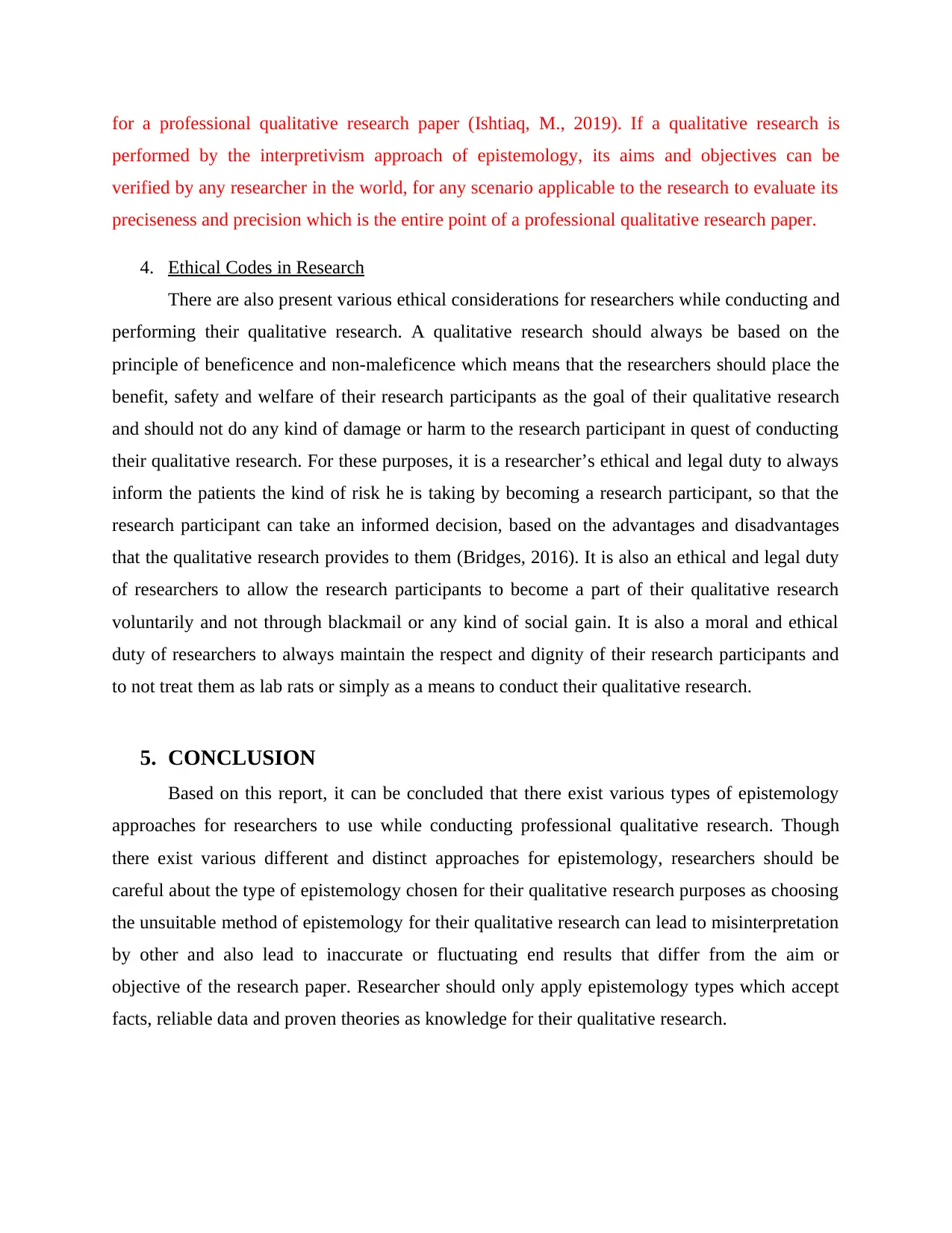
for a professional qualitative research paper (Ishtiaq, M., 2019). If a qualitative research is
performed by the interpretivism approach of epistemology, its aims and objectives can be
verified by any researcher in the world, for any scenario applicable to the research to evaluate its
preciseness and precision which is the entire point of a professional qualitative research paper.
4. Ethical Codes in Research
There are also present various ethical considerations for researchers while conducting and
performing their qualitative research. A qualitative research should always be based on the
principle of beneficence and non-maleficence which means that the researchers should place the
benefit, safety and welfare of their research participants as the goal of their qualitative research
and should not do any kind of damage or harm to the research participant in quest of conducting
their qualitative research. For these purposes, it is a researcher’s ethical and legal duty to always
inform the patients the kind of risk he is taking by becoming a research participant, so that the
research participant can take an informed decision, based on the advantages and disadvantages
that the qualitative research provides to them (Bridges, 2016). It is also an ethical and legal duty
of researchers to allow the research participants to become a part of their qualitative research
voluntarily and not through blackmail or any kind of social gain. It is also a moral and ethical
duty of researchers to always maintain the respect and dignity of their research participants and
to not treat them as lab rats or simply as a means to conduct their qualitative research.
5. CONCLUSION
Based on this report, it can be concluded that there exist various types of epistemology
approaches for researchers to use while conducting professional qualitative research. Though
there exist various different and distinct approaches for epistemology, researchers should be
careful about the type of epistemology chosen for their qualitative research purposes as choosing
the unsuitable method of epistemology for their qualitative research can lead to misinterpretation
by other and also lead to inaccurate or fluctuating end results that differ from the aim or
objective of the research paper. Researcher should only apply epistemology types which accept
facts, reliable data and proven theories as knowledge for their qualitative research.
performed by the interpretivism approach of epistemology, its aims and objectives can be
verified by any researcher in the world, for any scenario applicable to the research to evaluate its
preciseness and precision which is the entire point of a professional qualitative research paper.
4. Ethical Codes in Research
There are also present various ethical considerations for researchers while conducting and
performing their qualitative research. A qualitative research should always be based on the
principle of beneficence and non-maleficence which means that the researchers should place the
benefit, safety and welfare of their research participants as the goal of their qualitative research
and should not do any kind of damage or harm to the research participant in quest of conducting
their qualitative research. For these purposes, it is a researcher’s ethical and legal duty to always
inform the patients the kind of risk he is taking by becoming a research participant, so that the
research participant can take an informed decision, based on the advantages and disadvantages
that the qualitative research provides to them (Bridges, 2016). It is also an ethical and legal duty
of researchers to allow the research participants to become a part of their qualitative research
voluntarily and not through blackmail or any kind of social gain. It is also a moral and ethical
duty of researchers to always maintain the respect and dignity of their research participants and
to not treat them as lab rats or simply as a means to conduct their qualitative research.
5. CONCLUSION
Based on this report, it can be concluded that there exist various types of epistemology
approaches for researchers to use while conducting professional qualitative research. Though
there exist various different and distinct approaches for epistemology, researchers should be
careful about the type of epistemology chosen for their qualitative research purposes as choosing
the unsuitable method of epistemology for their qualitative research can lead to misinterpretation
by other and also lead to inaccurate or fluctuating end results that differ from the aim or
objective of the research paper. Researcher should only apply epistemology types which accept
facts, reliable data and proven theories as knowledge for their qualitative research.
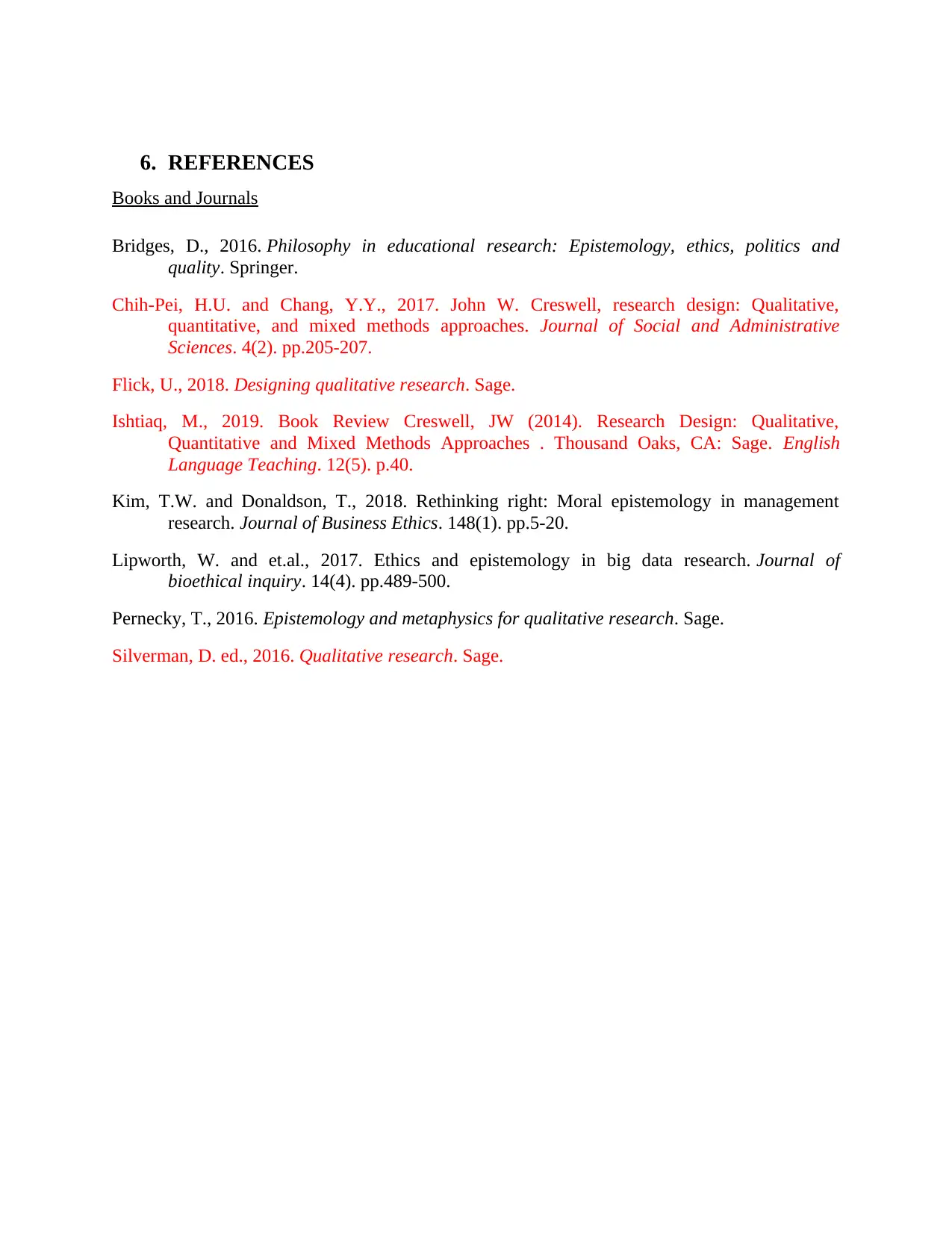
6. REFERENCES
Books and Journals
Bridges, D., 2016. Philosophy in educational research: Epistemology, ethics, politics and
quality. Springer.
Chih-Pei, H.U. and Chang, Y.Y., 2017. John W. Creswell, research design: Qualitative,
quantitative, and mixed methods approaches. Journal of Social and Administrative
Sciences. 4(2). pp.205-207.
Flick, U., 2018. Designing qualitative research. Sage.
Ishtiaq, M., 2019. Book Review Creswell, JW (2014). Research Design: Qualitative,
Quantitative and Mixed Methods Approaches . Thousand Oaks, CA: Sage. English
Language Teaching. 12(5). p.40.
Kim, T.W. and Donaldson, T., 2018. Rethinking right: Moral epistemology in management
research. Journal of Business Ethics. 148(1). pp.5-20.
Lipworth, W. and et.al., 2017. Ethics and epistemology in big data research. Journal of
bioethical inquiry. 14(4). pp.489-500.
Pernecky, T., 2016. Epistemology and metaphysics for qualitative research. Sage.
Silverman, D. ed., 2016. Qualitative research. Sage.
Books and Journals
Bridges, D., 2016. Philosophy in educational research: Epistemology, ethics, politics and
quality. Springer.
Chih-Pei, H.U. and Chang, Y.Y., 2017. John W. Creswell, research design: Qualitative,
quantitative, and mixed methods approaches. Journal of Social and Administrative
Sciences. 4(2). pp.205-207.
Flick, U., 2018. Designing qualitative research. Sage.
Ishtiaq, M., 2019. Book Review Creswell, JW (2014). Research Design: Qualitative,
Quantitative and Mixed Methods Approaches . Thousand Oaks, CA: Sage. English
Language Teaching. 12(5). p.40.
Kim, T.W. and Donaldson, T., 2018. Rethinking right: Moral epistemology in management
research. Journal of Business Ethics. 148(1). pp.5-20.
Lipworth, W. and et.al., 2017. Ethics and epistemology in big data research. Journal of
bioethical inquiry. 14(4). pp.489-500.
Pernecky, T., 2016. Epistemology and metaphysics for qualitative research. Sage.
Silverman, D. ed., 2016. Qualitative research. Sage.
⊘ This is a preview!⊘
Do you want full access?
Subscribe today to unlock all pages.

Trusted by 1+ million students worldwide
1 out of 6
Related Documents
Your All-in-One AI-Powered Toolkit for Academic Success.
+13062052269
info@desklib.com
Available 24*7 on WhatsApp / Email
![[object Object]](/_next/static/media/star-bottom.7253800d.svg)
Unlock your academic potential
Copyright © 2020–2026 A2Z Services. All Rights Reserved. Developed and managed by ZUCOL.





